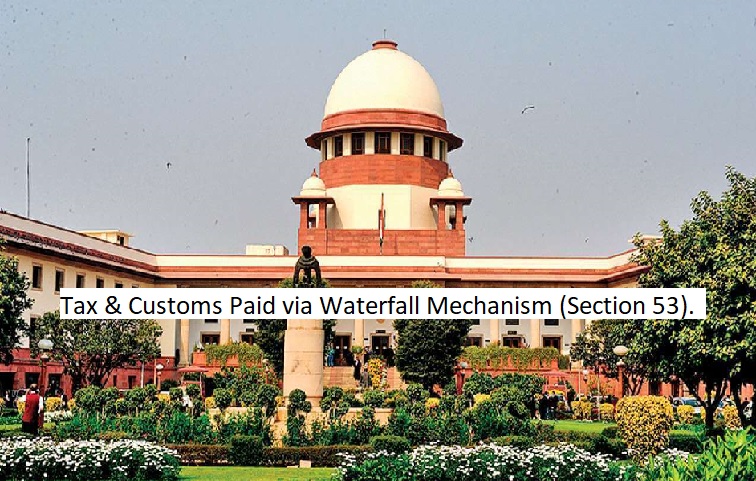


In a significant legal development, the Supreme Court, presided over by Justice Sanjiv Khanna and Justice S.V.N. Bhatti, has issued a crucial clarification regarding the payment of dues owed to the Central Board of Indirect Taxes & Customs, Department of Revenue, under the provisions of Section 53 of the Insolvency and Bankruptcy Code, 2016 (IBC). This clarification stems from the necessity to address the priority and mechanism for settling these dues when a company undergoes insolvency proceedings.
Section 53 of the IBC holds immense importance in the context of insolvency cases in India. It outlines the order of priority in which the proceeds from the sale of assets of a company undergoing insolvency are to be distributed among various stakeholders. This includes creditors, operational creditors, financial creditors, and other claimants. The provisions of this section determine the sequence in which different classes of creditors are to be paid, ensuring that the distribution process is transparent and equitable.
One crucial aspect of this distribution process is the treatment of tax and customs dues owed to the Central Board of Indirect Taxes & Customs. The clarification issued by the Supreme Court emphasizes that these dues will be settled following the "waterfall mechanism" specified in Section 53. This mechanism ensures that tax and customs dues are given a specific order of priority, in accordance with the framework established by the IBC.
The "waterfall mechanism" under Section 53 mandates that certain categories of creditors must be paid in a particular sequence. Typically, secured financial creditors are given the highest priority, followed by unsecured financial creditors. Operational creditors, which may include suppliers and service providers, fall further down the order. This mechanism is designed to strike a balance between the interests of various stakeholders and ensure that insolvency proceedings are conducted in a fair and systematic manner.
The Supreme Court's pronouncement on this matter provides clarity and guidance in situations where there may be ambiguity or disputes over the payment of tax and customs dues during insolvency proceedings. It underscores that these dues should not take precedence over other financial obligations specified under Section 53. Instead, they should be settled in accordance with the established order of priority.
The implications of this clarification are significant. It ensures that the revenue department's claims, specifically those related to tax and customs dues, are subject to the same rules and hierarchy as other financial obligations in an insolvency scenario. This decision aligns with the overarching principles of the IBC, which seek to promote a balanced approach in addressing the rights of all stakeholders in an insolvency case.
Furthermore, the Supreme Court's ruling serves as an essential reference point for insolvency professionals, creditors, and the revenue department when navigating the complex landscape of insolvency proceedings. It provides a legal precedent that can be invoked to ensure a fair and systematic resolution of cases involving tax and customs dues.
In summary, the Supreme Court's clarification on the treatment of tax and customs dues under Section 53 of the IBC reaffirms the commitment to a well-defined order of priority in insolvency proceedings. It emphasizes that the waterfall mechanism provided by the IBC should be followed for the settlement of these dues, ensuring equity and fairness for all stakeholders involved in the process. This decision contributes to the legal certainty and transparency required for effective insolvency proceedings and sets a precedent for future cases involving similar issues.
TAGS: Supreme Court Justice Sanjiv Khanna Justice S.V.N. Bhatti clarification dues Central Board of Indirect Taxes & Customs